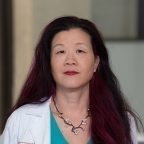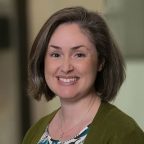April is Head and Neck Cancer Awareness Month, and in this short episode we talk with Dr. Laura Chow at the Livestrong Cancer Institutes, about the basics of Head and Neck Cancers.
Guests
 Laura ChowDirector of Lung, Head, Neck & Clinical Immunotherapy Programs, Livestrong Cancer Institutes
Laura ChowDirector of Lung, Head, Neck & Clinical Immunotherapy Programs, Livestrong Cancer Institutes
Hosts
 Kristen WynnSenior Administrative Program Coordinator at the Livestrong Cancer Institutes
Kristen WynnSenior Administrative Program Coordinator at the Livestrong Cancer Institutes
We are a resource for learners, including every member of the live strong cancer institutes on track educational pipeline from middle school to residency, we are a growing collection of interviews, talks and experiences, the uncover, the myths and the uncertainties of cancer and careers in cancer in order to empower and inspire generations of thinkers and leaders.
This is cancer uncovered an education and empowerment podcast by the live strong cancer institutes.
Uh,
hello, you’re back. This is Kristin. When with the live strong cancer institutes, April is head and neck cancer awareness month. So for this short cancer awareness episode, I invited the one, the only Dr. Laura chow of the live strong cancer institutes to talk with us. Laura is an internationally renowned clinician who.
Many hats here at the LCI. So I’m Laura chow. I’m the associate director of clinical research at live strong cancer institutes and the director of the lung head and neck and clinical immunotherapy programs as well as associate chair of education and the department of oncology at the university of Texas Austin, Dell medical school.
Thank you. Thank you, Dr. Chow. So we are here to just give our audience some, some information, some awareness about head and neck cancer, because it is April and there’s a focus on head and neck cancer awareness in the month of April here in the U S so what is headed next? So head and neck cancer, commonly refers to cancers that arise from the head and neck region.
And when we refer to that, we talk about those that come about from the oral cavity, the cheek area, the tongue area. And then we also look at the tonsils, the oral pharynx, the voice box and the larynx area, as well as that, of the nasal area, nasal pharynx and the sinuses. And lastly, that of the salivary plan.
Most of these cancers are what we call squamous cell cancers, which have a characteristic appearance under the microscope. And these cancers generally arise in, into head region and then spread to form lymph nodes are, um, masses in the neck. So head and neck cancers have generally arisen from risk factors of smoking and alcohol intake.
And thankfully, this is on the. But the other major risk factor, which is barley meaty, it is that of human papilloma virus, mediated cancers, which commonly are those that arise in the tonsils and the oral pharynx for the back of the throat. These cancers are on the rise overall due to early detection and our awareness of HPV related cancers.
These comprise of at least, um, overall head and neck cancers comprised of 4% of all the cancers in the United States. And in 2021, 66,000 people will develop head and neck cancer. And this will actually call. 14,000 deaths or more per year. So this is still a major cancer and this contributes to 900,000 cases worldwide and 400,000 deaths annually.
So how is cancer screening? So generally dentists, uh, are pretty good at screening for head and neck cancer. Most patients that go to their dentist will have a evaluation for any unusual coloring inside the oral cavity. Or also abnormal thoughts or lumps in the neck region. Often if there’s complaints of either nasal stuffiness or a lump or spot the neck, um, patients will commonly go to their primary care provider and get a referral to ear, nose and throat surgeon who will evaluate this further by a more careful look inside the nose or mouth area and in the sinus.
Why do you work with patients with this type of cancer? How did you arrive here? Oh, head and neck cancers are really difficult in terms of the fact that there’s headed, that cancers really affect function and appearance. And it’s a major factor for a lot of our patients. If diagnosed early, we can commonly treat these and cure them and we can mitigate a lot of.
The morbidity or the functional or cosmetic aspects of having head and neck cancer, we’re able to treat it early and hopefully, uh, be able to treat this and cure it. I think these patients really need a lot of support and help, and there’s a lot of new treatments that need to be developed. And that’s my area.
In clinical research and developing new drugs. This is a huge unmet area in terms of how we can improve the lives of these patients with head and neck cancer and improve their survival and outcome. Are there any initial resources that you would recommend for students that are listening, who might be interested in learning more?
Uh, I think probably the American cancer society websites are very helpful. The haircut society of clinical oncology. So has a lot of resources and then I might be a little bit more in depth, the NTCN or what we called the national comprehensive cancer network also puts out a lot of resources for patients and those wanting to learn more.
Is there anything else that I, um, that I didn’t ask that I should have? Or is there anything else that you’d like to share with. So, thank you so much for bringing awareness. Obviously head and neck cancer awareness month is really important. And the fact that this is still a major cancer where we can improve upon, and there are good preventative aspects to preventing people from having.
Head and neck cancer, such as HPV-related oral pharyngeal cancer, and with vaccination and vaccination of people at a younger age, we’re able to prevent a lot of these cancers. So hopefully I won’t have to treat very many of them in the future. Thank you, Dr. Chow for sharing your time and expertise.
Please reach out to us. If you have any questions about head and neck cancers or other previous episodes, we’d also love your input for what we should include in future episodes of cancer uncovered, you can email us at live strong cancer institutes at Dell med dot U two. EDU, you can also visit us on the worldwide web at Dell med dot U, texas.edu.
Please also make sure to follow our chair, Dr. Gale at kart on Twitter. Her handle is S Gale at cart at cart is spelled E C K H a R D T. This is Kristin when for cancer uncovered. Thank you for listening and learning with us. Stay curious.